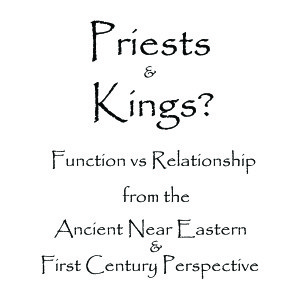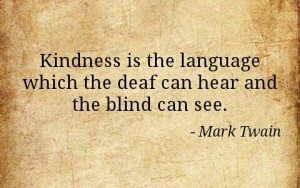 We were raised with the concept of our congregations being Holy Ground if they are dedicated to the Lord. The Hebrew for this is admat kedusha and we first see it mentioned when Moses is at Sinai before the burning bush in Ex 3:5. We see this word translated holy, kedusha, in reference to surprisingly few things in scripture – the people of Israel (as a whole, not individually), Sabbaths and Feasts (times), the Temple and the Land of Israel (places) and the tithe (a grant set aside for the actual genetic Levites) and the Temple furnishings (things). No people outside of those in Covenant are called holy, no times apart from His Sabbath and Feasts are declared holy and no place outside of the Land of Israel is declared holy. The commandment to “be holy as I am holy” in Lev 11:44 is a corporate commandment to a holy people to act according to their conferred status, as a reflection of the character and kedusha of their God.
We were raised with the concept of our congregations being Holy Ground if they are dedicated to the Lord. The Hebrew for this is admat kedusha and we first see it mentioned when Moses is at Sinai before the burning bush in Ex 3:5. We see this word translated holy, kedusha, in reference to surprisingly few things in scripture – the people of Israel (as a whole, not individually), Sabbaths and Feasts (times), the Temple and the Land of Israel (places) and the tithe (a grant set aside for the actual genetic Levites) and the Temple furnishings (things). No people outside of those in Covenant are called holy, no times apart from His Sabbath and Feasts are declared holy and no place outside of the Land of Israel is declared holy. The commandment to “be holy as I am holy” in Lev 11:44 is a corporate commandment to a holy people to act according to their conferred status, as a reflection of the character and kedusha of their God.
There is a reason I am bringing this up, and it is because of a really excellent question I was asked last night about clean vs unclean in light of modern non-Temple times. The question was:
“How does cleanliness and uncleanliness relate to us today as the redeemed in Yeshua (Jesus). I will state I believe we should be abstaining from things that will make us unclean, such as the things we eat, etc, but obviously there are things that aren’t sin that bring uncleanliness.
My question is, according to your knowledge of the subject, how does uncleanliness affect us today when there is no earthly temple standing, and does it affect our relationship with Abba……. For instance, if I touch a corpse, with your current understanding do I lose some level of relationship with Abba, such as my prayers going unheard that day etc? Does Yeshua bring us a permanent state of cleanliness on a macro perspective?”
In order to even go in to the subject of kedusha and holy ground, I need to lay a foundation of the importance of clean vs unclean. Clean vs unclean is not usually about sin – in fact it almost never is, unless one is eating unclean foods or having sexual relations during a woman’s menstrual cycle. The most common reasons for being unclean in Temple times was marital sexual relations and a woman’s menstrual cycle, which are both tied to the blessing of bringing forth life and are functions we were created for. Ritual cleanness was tied to how closely a man or woman could approach the physical throne of God on earth. While describing the not yet existing third Temple, God tells the prophet Ezekiel this:
Ez 43:4-7a And the glory of the Lord came into the house by the way of the gate whose prospect is toward the east. So the spirit took me up, and brought me into the inner court; and, behold, the glory of the Lord filled the house. And I heard him speaking unto me out of the house; and the man stood by me. And he said unto me, Son of man, the place of my throne, and the place of the soles of my feet, where I will dwell in the midst of the children of Israel for ever
Whenever there is a Temple, it will be the physical place of the throne of God and if you continue to read on in Ezekiel, you will see dimensions for a man-made Temple that has never been built.
One cannot physically approach the throne of God in an unclean state or:
Lev 15:31 “Thus you shall keep the people of Israel separate from their uncleanness, lest they die in their uncleanness by defiling my tabernacle that is in their midst.”
Note that this applied to all the types of uncleanness from Lev 12 through 15, those applying to both male and female. Leprosy, seminal emission, normal sexual relations, childbirth, menstrual cycle, and any abnormal bodily discharge. And we know from the Talmud that men and women were held to the same exact standards during Temple times. A priest who had a seminal emission during the night had to immediately leave, mikveh and go home until sundown the next day. Men who had sexual relations were held to the same standards as menstruating women and were confined to the same courtyard on the Temple Mount. There were no double standards as we see in Messianic congregations today. In fact, let’s talk about the application of clean vs unclean in our local congregations.
We see very clearly in scripture that the highest level of uncleanness that still allowed you on the Temple Mount, but outside the Temple complex was corpse impurity. It was so severe that it took the ashes of the red heifer to cleanse a man or a woman from the impurity they naturally gained from lovingly preparing the corpses of their loved ones for entombment. Joseph of Arimathea would not have been able to eat of the Passover after touching the body of Yeshua because that meat had been sacrificed and was therefore holy, kedusha – and certainly no one would accuse him of sin. He would have gone to the priests at some time afterwards to be cleansed with the ash water in order to partake of the second Passover the next month.
So now we have a problem, if we are going to implement cleanliness standards in our congregations – (1) we are encroaching on the exclusive rights of YHVH to say what is and what is not admat kedusha, by taking it upon ourselves to decide and doing things according to our own understanding – but only God can set apart space (land) and and times as kedusha, not us; (2) we are misappropriating the reasons for separation as dictated in Lev 15 – the separation of the unclean, by degrees, from physically approaching the Temple, the physical throne of YHVH; (3) if we are going to exclude menstruating women and those who have birthed a child, we must also exclude anyone who has had a seminal emission the night before as well as any couple who engaged in sexual relations – not to mention anyone who has corpse impurity, which means no police, no firefighters, no doctors, nurses, EMT’s, hospice workers, soldiers who have seen action, or those who have suffered through the death of a loved one OR have even been in a house with a dead person (thanks Ryan White for that, see note at bottom).
Let’s face it – we are all pretty much unclean. We live in an unclean world, we have no access to the ashes of the red heifer, so pretending we are clean is a sham. Holding men and women to differing standards of kedusha, in addition to being unscriptural in most cases (because we have no right to go beyond what is written nor to deviate from the intent of respecting the kedushah of the Holy place), is inaccurate weights, as we see in the Proverbs:
Lev 11:1 A false balance is abomination to the Lord: but a just weight is his delight.
So the next time you see a Pastor quiz women on their menstrual status, know that they have no standing to declare their congregations holy ground, and know that unless they are asking men about seminal emissions and couples about sexual relations, they have no leg to stand on. And if that Pastor has ever touched a dead body, they are really playing with fire because their uncleaness is far more serious than any menstruating woman – because there is no way currently to get rid of it.
Should we endeavor to lead clean lives? Yes, as much as possible, but we should also live informed lives and lives free from hypocrisy. We also have to face the fact that living in exile has its penalties, one of which is being unclean.
So now, back to the original question – no, our cleanness/uncleanness level has nothing to do with our relationship with God, only with how closely we can approach His physical throne on earth. Now that we have a Heavenly High Priest with 24/7 access to the Heavenly throne of the Father, our mediator/patron Yeshua (Jesus), we have access to the throne of grace without even having to approach the physical Temple. We don’t have actual physical access like a High Priest would, but we have access through Yeshua, who has direct access. Uncleanness, as Daniel Botkin once explained to me, is nothing more than a temporary disqualification from going to the Temple.
I hope that helps! I wrote about Niddah and the temporary Temple attendance disqualification in my book, The Bridge, if you need more clarification.
(Note: Thanks to Ryan White, who just added this – Num 19:14 clearly states that even being in a room with a dead body renders one ritually impure from corpse impurity, and needing the red heifer ashes after 7 days)



